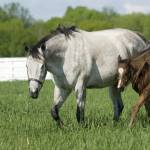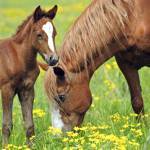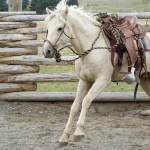Do Broodmare Diets Influence Metabolic Status of Foals?

Broodmares must have their nutritional needs met in order to produce healthy, well-grown foals. However, there is some question as to exactly how and what to feed broodmares through the course of pregnancy because the mare’s requirements change as the pregnancy progresses.
Fetal development is slow in the early stages but greatly accelerates in the last trimester when growth speeds up and nutrients are stored in the fetal liver. Grain is often added to the mare’s diet during late pregnancy, but there are concerns about feeding a high level of carbohydrate-rich grain. Will feeding the mare with grain produce a foal that is at higher risk for insulin resistance, skeletal lesions, or various metabolic problems?
In a study* conducted by French and Belgian researchers, 24 mares were bred with semen from the same stallion and were pastured until the seventh month of pregnancy. At that point they were stalled and divided into two groups. Mares in the first group were fed only hay, and mares in the second group were fed hay and barley. All mares were given vitamins and minerals, and all were returned to pasture after delivering their foals.
Mares that were not fed grain lost weight through late pregnancy. Mares in the barley-fed group showed significant changes in glucose metabolism, showing two daily plasma glucose peaks after meals, increased insulin release, and decreased insulin sensitivity. However, these changes were not reflected in differences between the groups of pre-weaned foals.
The researchers weighed the foals monthly from birth until weaning at about six months of age. They measured levels of growth factor, thyroid hormones, insulin sensitivity, and other metabolic parameters at intervals during this period. They found no significant effects of diet, with foals from both groups having similar body weights, hormone and calcium levels, insulin secretion, and glucose metabolism rates.
Kathleen Crandell, an equine nutritionist with Kentucky Equine Research, points out that regardless of the broodmare’s diet, the safest nutritional management of nursing foals and weanlings is to weigh and measure these young horses on a frequent basis, aiming for a smooth, steady plane of growth. If grain is offered, it should be of a type and quantity that does not cause a large glycemic response. This feeding plan has been shown to minimize skeletal problems in young, growing horses.
*Click for the full text of “Feeding pregnant mares with concentrates has no impact on pre-weaning foal growth and glucose metabolism.”








